What do the housing ballot referendums mean and how should I vote on them?
Understand the big proposals that claim to streamline new affordable housing
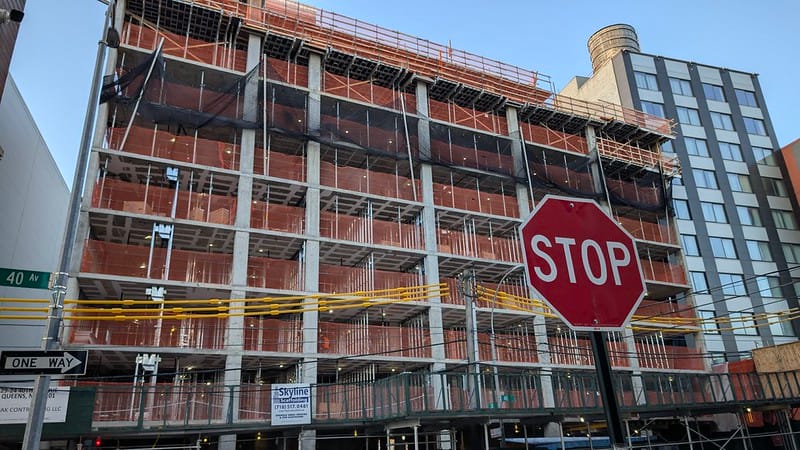
Election Day itself is rapidly approaching, and early voting starts on Saturday, which means it’s time for you to lock the fuck in and decide how you’re going to fill out your ballot. I’m going to go out on a limb here and say that as a reader of The New York Groove you already know who you’re picking for mayor and City Council if you live in one of the districts with an actual City Council race (a write-in vote for Dave Colon in both obviously).
But we’ve heard from some of you that you’re unsure how to vote in the ballot referendums focused on affordable housing, which are on the back of your ballot, don’t forget about them. So I settled into a bath on a relaxing Sunday night after the baseball game was out of hand and I read the Charter Revision Commission report. Here’s what you need to know:
There’s what on the back of my ballot?
When you vote in the general election, you don’t just get to vote for people running for office, you also have to remember to flip your ballot over and choose “Yes” or “No” on six ballot referendums. Questions 1, 5 and 6 are generally uncontroversial. Question 1 is about expanding an upstate winter sports complex in exchange for New York State purchasing more forest preserve land, number 5 is about digitizing the city map instead of leaving the city’s official topography up to mismatched ancient paper maps that each borough president’s office keeps and number 6 is about moving the city’s municipal elections to even years so they line up with presidential elections.
But questions 2, 3 and 4 all deal with changes to the way that the city approves zoning changes for affordable housing projects, something that’s never contentious. The guiding principle of these changes is moving power to approve housing proposals away from individual City Council members and the City Council and more towards the mayor, in an attempt to cut down on the amount of time and effort it takes to get the projects through the approval process.
Like I said, it's something that's never contentious, which is why there's a pitched battle between YIMBY groups like Open New York and allied elected officials like Comptroller Brad Lander and Borough presidents Mark Levine, Antonio Reynoso and Donovan Richards on one side; and many City Council members and labor unions on the other side.
Okay I will listen to whatever you say to do.
Bad idea! But I will at least tell you what the questions do. In each case, the ballot questions suggest making changes to the Uniform Land Use Review Procedure, or ULURP, which is the process that governs zoning changes across the city.
U live, U lurp.
Yeah my friend invented saying that.
Oh no.
It’s fine, we just have to pay for printing that. Anyway, the Charter Revision Commission's general attitude is that ULURP is too uniform, and that individual City Council members have too much power to stop housing proposals thanks to an informal practice known as “member deference,” a custom in which the City Council as a whole generally backs a local Council member’s decision to support or reject individual housing applications in their district.
ULURP and member deference, the Charter Revision Commission suggest, create an untenable process for even modest zoning changes for affordable housing projects. Affordable housing developers agree; one anonymous developer who wasn’t authorized to speak on behalf of their company told The Groove they were all-in on the ballot questions. “The ballot proposals are good and some of the recommendations should streamline the beat-to-death ULURP process,” they said. “It also finally creates a mechanism to circumvent member deference which has tortured these things to no end."
Before you say it, every time you see the phrase “affordable housing” in this blog post replace it with “rent-stabilized housing restricted to specific income bands for the purposes of ensuring a tenant pays at most 30% of their income to rent.” This is why we all just agree to call it “affordable housing.”
Okay so what are we actually voting on?
Ballot Question 2 does two things: one, allow a new, faster zoning process that runs through the Board of Standards and Appeals, a mayoral-appointed board, to oversee 100% publicly financed, 100% affordable housing projects. The goal is to get the projects approved or rejected in about 120 days.
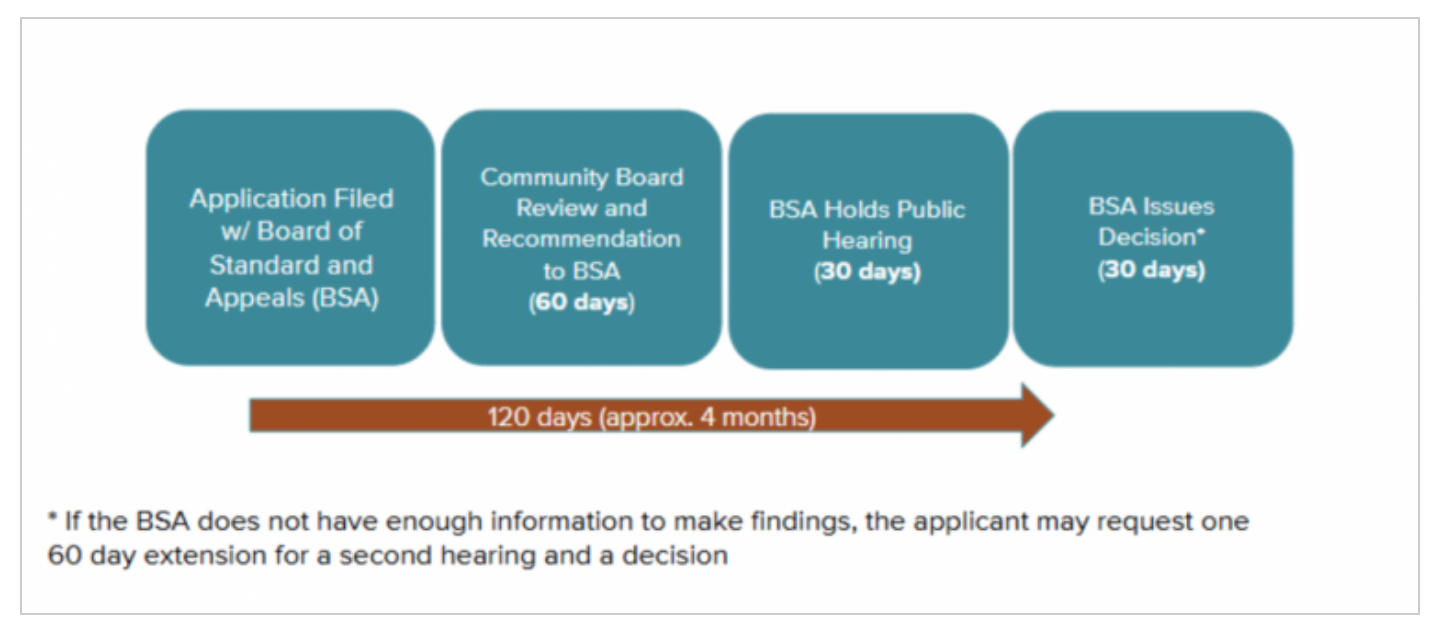
The second thing the question does is reduces the amount of time it takes to review projects that include affordable units in the City Council districts that create the least amount of affordable housing in the city.
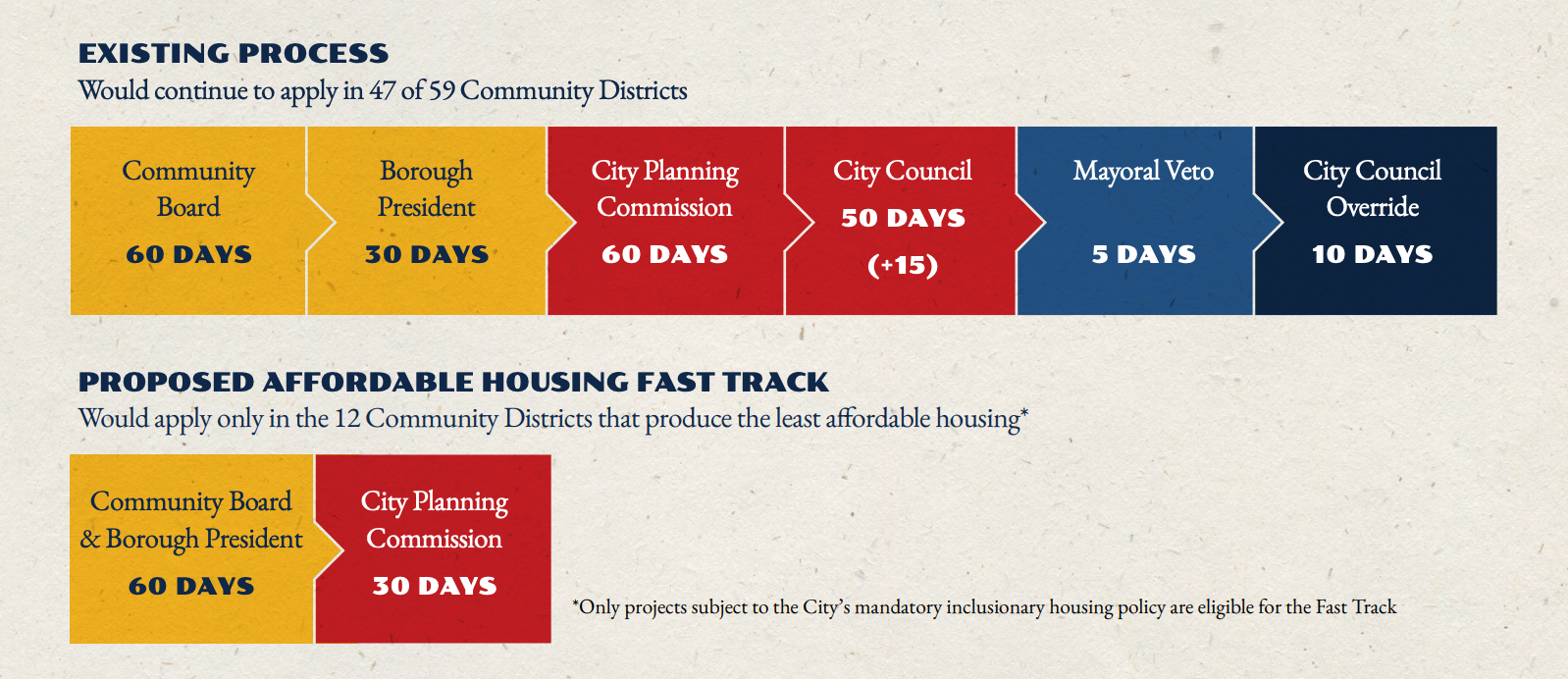
But why?
As the Charter Revision Commission tells it, using ULURP as a way to decide what happens with publicly financed affordable housing projects makes the projects take much longer than they should, which in turn drives up costs for actually building the housing.
“The process for a Fast Track Zoning Action would balance the need for community input with the imperative to move affordable housing projects more quickly,” the commission members wrote.
For the second piece of the question, the commission argues that the affordable housing fast track would give some teeth to the Fair Housing Framework that the City Council itself passed in 2023. While the Council passed its housing law in 2023 to shine a light on where housing is actually created in the city, the report it produces has no actual enforcement mechanism when it shines a light on where said housing isn’t being built, as pointed out by the commission:
“[T]he Council’s Fair Housing Framework today promotes disclosure and transparency around patterns of housing development but cannot directly affect those patterns. If a Community District fails to meet a housing target, nothing about the land use process changes…[The Affordable Housing Fast Track] creates an enforcement mechanism for the Fair Housing Framework, advancing the Framework’s core goal to promote fair housing and equitable housing development.”
Ballot Question 3 replaces ULURP for “modest” housing proposals that include affordable housing with a new review process would speed up zoning changes for these smaller projects. Under this new process, the separate 60-day community board and 30-day borough president review periods would be combined into one 60-day review period, followed by a 30-day review by the City Planning Commission.
But why?
As a “uniform” process, smaller housing proposals aren’t built for ULURP, which, per the CRC, can be long and expensive. ELURP, as the commission calls the proposed new process, will right-size the rezoning process so that housing proposals built by smaller developers can actually get done, the commission claims.
Ballot Question 4 creates a new appeals process for ULURP applications that include affordable housing. If the City Council votes down a proposal, or changes it too much and then approves it, a three-person board made up of the mayor, the relevant borough president and the Speaker of the City Council could override the vote if two of the three agree. This process still allows the City Council to wield its power over rezonings by voting as a full body, but still puts a check on the Council’s powers by allowing a new body to overrule them.
But why?
Too much member deference, per the Charter Revision Commission, and borough presidents need something to do. That last one isn’t literally what the Commission wrote, but historically borough presidents had a much bigger role in land use decisions and this new appeals board would restore some of that power by treating a borough president “as a democratically accountable official who occupies a middle point between hyperlocal and citywide perspectives.”
Well, everyone loves efficiency so everyone loves these right?
Ha ha then why would I be writing a 2,000 word imaginary conversation about the questions? Some people are in fact totally behind the proposals. Comptroller Brad Lander, Manhattan Borough President (and presumptive next comptroller) Mark Levine and fellow Borough presidents Antonio Reynoso (Brooklyn) and Donovan Richards (Queens) have joined YIMBY organization Open New York for a push in favor of the ballot proposals. The New Kings Democrats are also urging “Yes” votes on all of them. These are reform types of course, who would most likely agree with what the frustrated affordable housing developer told The Groove about the land use process in the city.
"The biggest impediment to taking on new affordable projects on private land, beyond money, is the expense to get through the velvet rope with ULURP and get to a go/no go decision," the developer said. "It's a huge investment just to get to a ‘maybe’ from Council members who can hold you hostage. Anything that gets to a faster decision at least let's us keep moving before we are married to a bad project that has suffered death by a thousand cuts of program changes and public commitments that make the project less viable financially and drag it out forever."
Hell Gate spoke to a number of exhausted-sounding housing analysts who were lukewarm on the actual impact that the proposals could have on affordable housing development but also, doubted the apocalyptic impact the proposals could have on the city as a whole.
Apocalyptic impact?
Clearly you have not seen the fliers in my neighborhood featuring an AI-generated skyline above an AI-generated series of "U-Hail" trucks taking people away from the city.
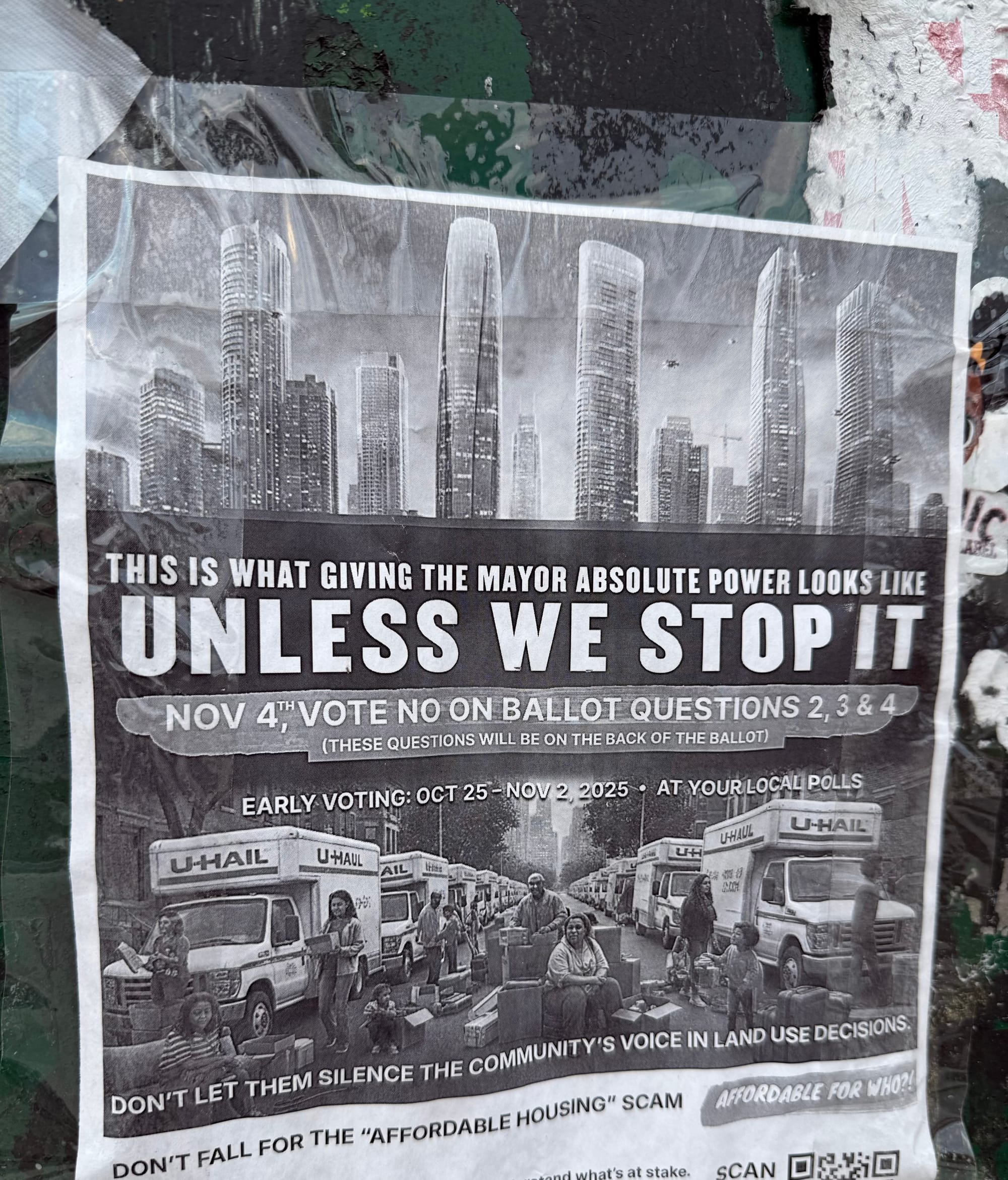
You also haven’t gotten one of these fliers from the City Council urging you to vote no.

Members of the City Council, led by outgoing Speaker Adrienne Adams, are understandably pissed about the possibility of losing some power to decide how housing gets built, to the point where they keep skirting the rules on what counts as using city resources as electioneering, which is illegal. The Council coalition against the referendums are backed up by labor unions 32BJ SEIU, the District Council of Carpenters and Hotel and Gaming Trades Council, with all parties arguing that the City Council’s ability to possibly tank housing applications creates better incentives to negotiate community and labor benefits.
Also some of the most reactionary members of the City Council are just straight up opposed to any affordable housing in their neighborhoods and are not ashamed to say it.
What does Zohran think about these?
I think you mean what do you all the candidates think about these. Curtis Sliwa as a reactionary devoted to “local control” is totally opposed to the referendums, Andrew Cuomo as a man who loves wielding power is in favor of them. Zohran Mamdani keeps hedging on them. Maybe it’s because he’s holding together an electoral coalition of YIMBY types AND unions AND Democratic bosses AND the DSA, maybe it’s because a national publication hasn’t asked him about the referendums, but for whatever reason he just keeps saying he’s mulling it over.
In my opinion, this is an unbelievable claim, in a literal sense that I do not believe it. For one he has a tight-knit team of operatives who do nothing but obsessively figure out what the right answer is to various sticky policy problems. And for two, as one activist mentioned to Hell Gate, it sure would help Mamdani’s goal of building 200,000 units of affordable housing if he had fewer pinch points in the process of siting them.
What does Mayor Adams think of the questions? I think the opposite.
We were among the people warning you to vote “No” on the mayor’s previous ballot proposals (that did not work). But before you dismiss these questions out of hand, keep in mind that on Jan.1 1 Eric Adams will not be the mayor and so he won’t be able to do whatever you think he could do to screw up the city if the mayor’s office is given some extra power over housing decisions.
So what do I dooooo?
Man I don’t know. I’ll tell you where I’m leaning at least, which is yes on 2 and 3 and no on 4, but maybe I’ll just wind up doing yes on 4 also.
What’s swaying me is that Crain’s got a look at a presentation that the City Council is giving to community boards behind the scenes, and while a lot of it just goes over the usual slop about "neighborhood character" and "local control," some of it is simply unbelievable to me. Complaining that your own fair housing reports will actually have something to enforce the findings is wack as hell! And you tell me, do these pictures of possible futures if Question 3 passes scare you? Because they do not scare me.
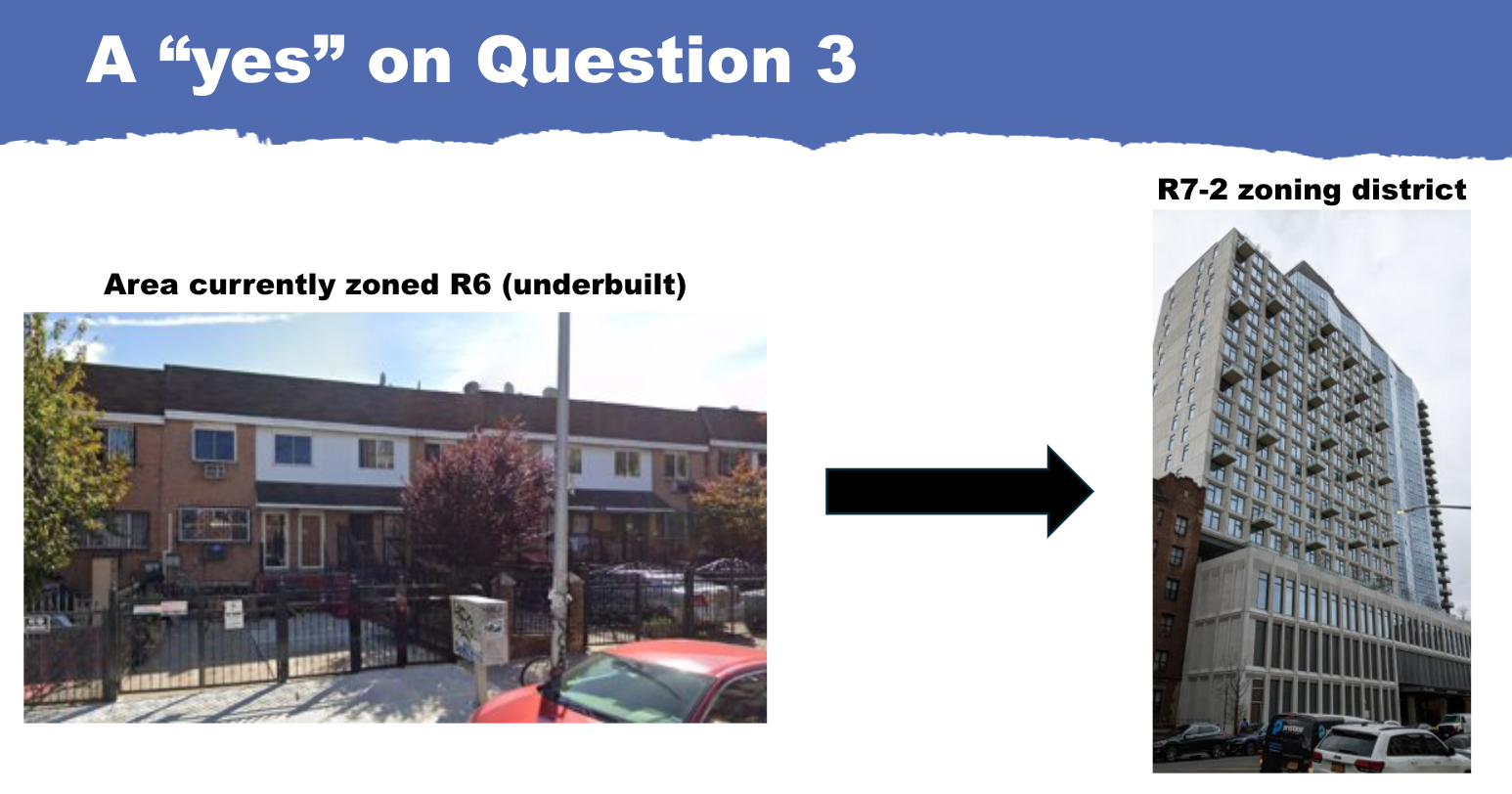
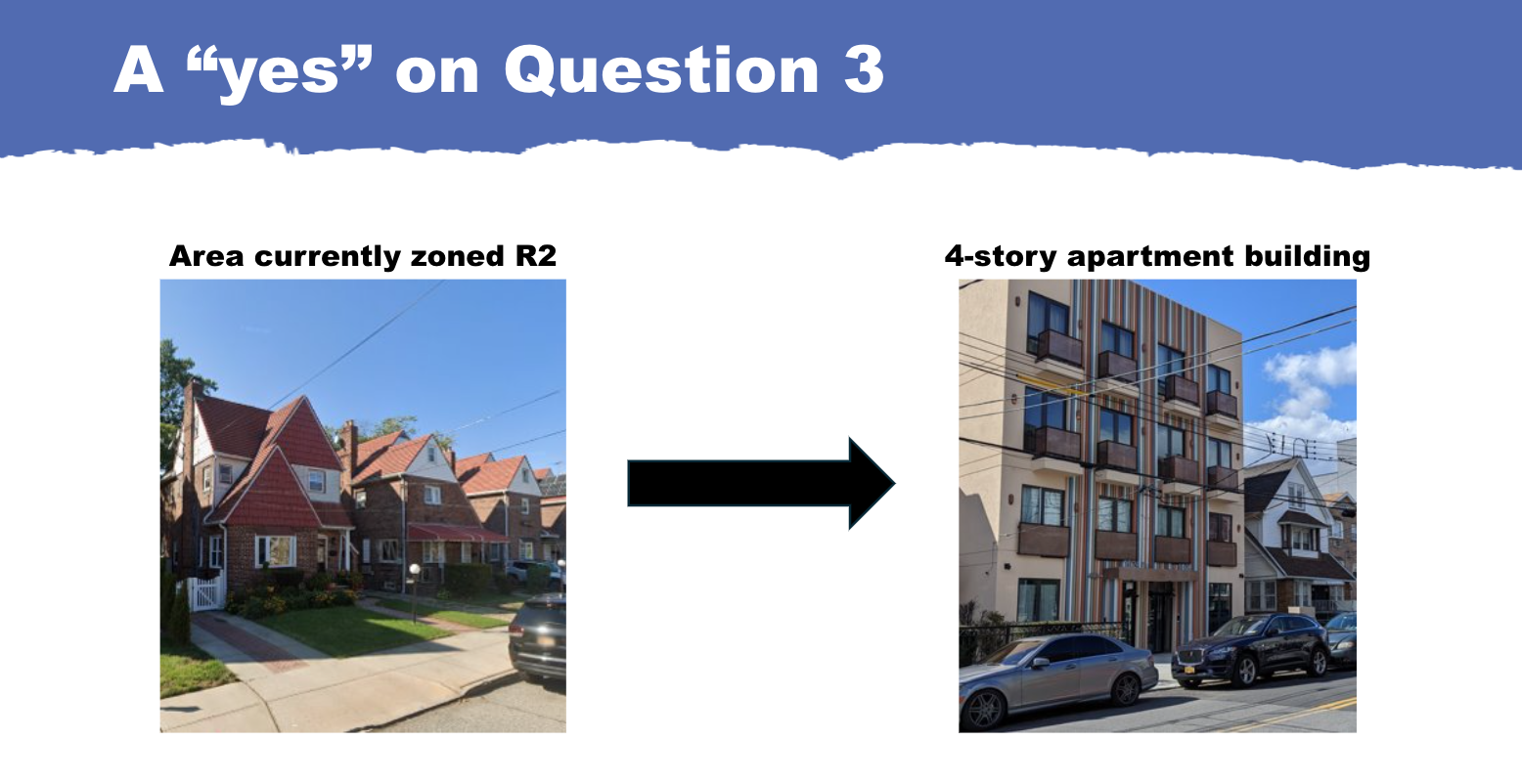
I understand the Council’s role in getting better outcomes from larger ULURP actions, and actually just lived through a situation where the mayor tried to kill the 34th Street busway and wound up having to promise it would happen to get a big rezoning in Midtown over the line. In the future there will no doubt be a shitty mayor I hate, but will that mayor also be serving at the same time as a specific shitty borough president or Council speaker that I hate, and therefore get their way on a ULURP application that sucks? It’s hard to say. I do see the utility in allowing the City Council to drive a harder bargain on neighborhood-wide upzonings. But I have also seen the Council demand parking instead of housing in these situations and have cursed them for it, so I could wind up swinging towards yes on 4 also.
I fucking love being an undecided voter.
But the average rent in New York City is currently $3,600 per month and our vacancy rate is barely above one percent. I see friends everywhere struggle to find somewhere to live. Into this situation, the City Council’s closing message in its community board slideshow opposing the measures is Our neighborhoods will no longer be affordable.
Affordable for who motherfucker?

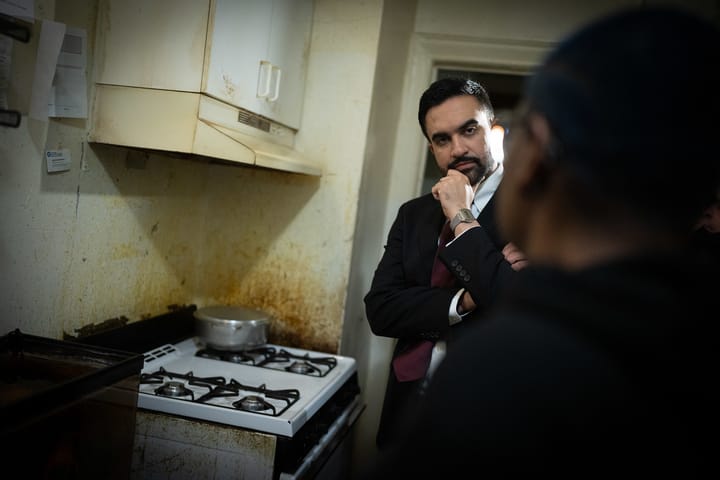


Comments ()